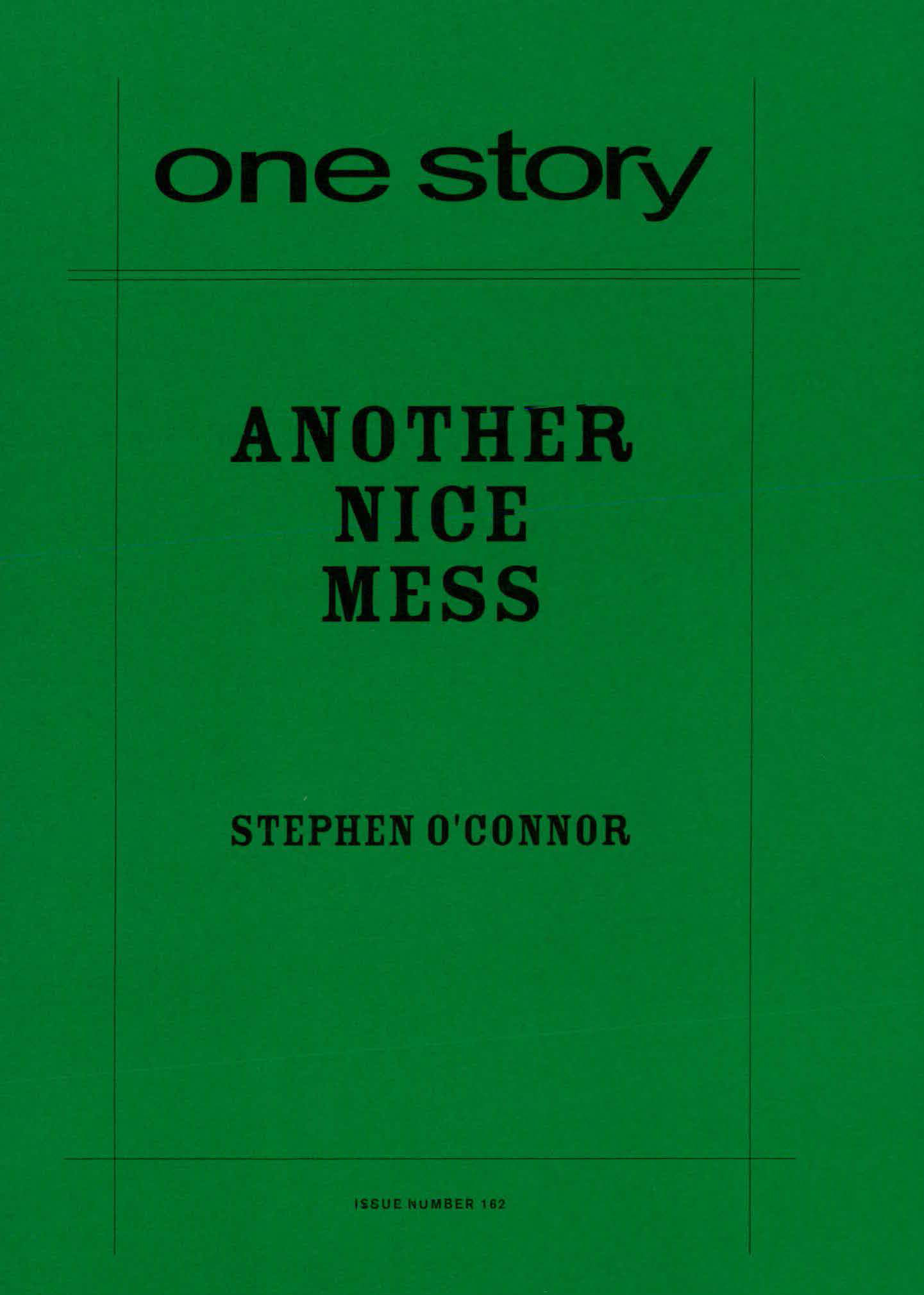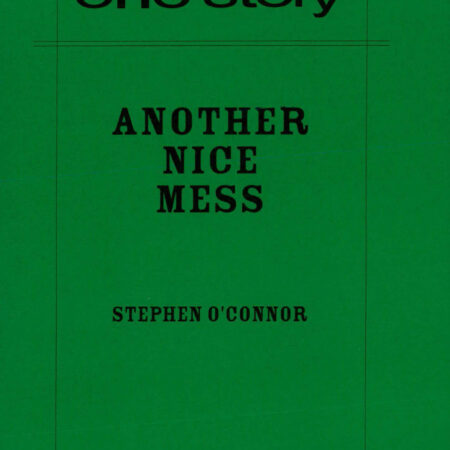
Another Nice Mess
$2.50
64 in stock
Excerpt
For most of the year since completing my degree, I have been required to devote my every waking thought to the Great War. This is work I neither like, nor feel suited to, though that does not mean I am not good at it; on the contrary, my very competence at my job may be the single factor that makes it least appealing.
The room where I work was once the ballroom of a grand manor house. The ceilings are so high they are often dimmed by water vapor, especially during rainy weather, and they are hung with crystal chandeliers that have only recently been wired to accommodate electric bulbs. The already considerable amplitude of the room is redoubled endlessly by wainscot-to-ceiling mirrors on all four walls, and its entire floor is occupied by long rows of utilitarian, wooden desks, stained apple-seed brown by years of cigarette smoke and finger grease. My desk is generally to be found toward the middle-right of the room, but on occasion it is all the way in the rear, and once it was just beside the front entrance.
Stephen O'Connor
Stephen O’Connor is the author of two collections of short fiction, Here Comes Another Lesson and Rescue, and of two works of nonfiction, Will My Name Be Shouted Out?, a memoir, and Orphan Trains: The Story of Charles Loring Brace and the Children He Saved and Failed, biography/history. His fiction and poetry have appeared in The New Yorker, Conjunctions, Electric Literature, Agni, Threepenny Review, Black Clock, Poetry Magazine, The Missouri Review, The Quarterly, Partisan Review, among many other places, and his story, “Ziggurat,” was read by Tim Curry on Selected Shorts in October 2011. His essays and journalism have been published in The New York Times, DoubleTake, The Nation, Agni, The Chicago Tribune, The Boston Globe, The New Labor Forum, and elsewhere. He teaches in the MFA programs of Columbia and Sarah Lawrence. For additional information, please visit www.stephenoconnor.net.
Q&A by Hannah Tinti
- HT: Where did the idea for this story come from?
- SO: I hesitate to talk about this because one aspect of my inspiration might make the story’s “meaning” and even its plot seem more fixed than I have ever intended them to be...But, in the spirit of full disclosure, here goes: One evening last summer, I was walking in the woods, idly thinking about the wars in Iraq and Afghanistan, when suddenly I was struck by a bolt of guilt. Specifically, I thought that since I hadn’t worked hard enough to oppose those wars, I was to some extent responsible for them. The thought passed. The guilt receded—as my political guilt has a tendency to do—and two or three days later it was time to begin a new story. Whenever I start something new, I try to keep my mind blank, and get out a first phrase or sentence without even thinking about it. In this case, what came out was my narrator’s statement about devoting every waking thought to the Great War. I had no idea why he was thinking about the war, or even that he was a “he,” but I did remember that bolt of guilt, and worried that I was in danger of producing an overly schematic political fable. So I decided to mix things up a bit and give myself a little more imaginative freedom, first of all by having my narrator working in the ballroom of an old mansion, and then by having that movie being shot in the next room—a movie which, to my surprise, turned out to star Stan Laurel. Once I’d surprised myself, I felt free to keep writing...and so the story emerged.
- HT: What was the most challenging aspect of writing this story?
- SO: I feel most inspired when I have no idea what I am doing. My favorite moment in jazz is when a soloist cuts loose from the melody and begins to improvise, and my favorite solos are those that come closest to the edge of noise, and even cross over a bit, without ever ceasing to feel like music. Whenever I write, I try as much as possible to get away from the “melody”—that is, from pre-established ideas, narrative structures, and even my own voice—and then just wing it. Of course I can never completely get away from the “melody”—nor would I want to (that would be too much “noise”)—but I do hope to get far enough away to surprise myself and, ideally, my reader with something new. In the case of this story, once I had brought together the logically, chronologically and tonally incompatible elements of my narrator’s present day job, the Great War, and Stan Laurel, my great challenge was to make all of these things, not just work together naturally, but seem to have a necessary connection...and I can only hope I succeeded.
- HT: There is a dream-like quality to “Another Nice Mess.” Is your writing influenced by your dreams? And how do you keep your readers grounded is such a surreal world?
- SO: Every now and then an image from one of my dreams will enter a story. I have had countless dreams, for example, that take place in concatenations of basement corridors, the holds of sunken ships, high school locker rooms, etc. and that dreamscape certainly did inspire the Minotaur’s Labyrinth in my story “Ziggurat.” But I don’t think I have ever drawn any substantial plot elements from a dream. I am, however, very interested in dream logic—that is, in the way that dreams can establish the necessary and natural connections between things and events that seem entirely unrelated when we think about them with our awake minds. I especially love the way that any character or object in a dream can have multiple identities simultaneously: a goldfish can also be your little sister; your best friend from kindergarten can also be the lunatic you saw on the subway, and so on. As for how I keep readers grounded: Partly I just employ that old trick fabulists have practiced since time immemorial of writing about the extraordinary as if it were utterly mundane. But I think the most important thing is to discover the natural and necessary connections between all the wacko events and characters in any given story. I don’t think this story would have worked if there hadn’t been some real connection between Stan Laurel’s hapless, childlike innocence and the narrator’s sense of being trapped, not just by a sinister job, but by sinister aspects of his own character. The narrator is hapless too, and wants, amid his guilt, to be forgivable in the way that Stan Laurel’s screen character always was. I think (hope!) that the story derives a lot of its energy and naturalness from that connection.
- HT: Why did you decide to include Stan Laurel as a character?
- SO: I didn’t really decide to include Stan Laurel; he just popped into my imagination, and I thought, “Okay, let’s see what happens now.” Once he was on the page, however, what I did was try to feel out connections between him, my narrator and the situation I had put them in. Had I not been able to find connections that seemed real and meaningful, Laurel would have disappeared from the story, or been kept on its margins. During my first draft, though, I try not to think about the meaning of what I am doing at all. Once the draft is done, I look it over and try to tease out that meaning. I ask myself questions like, “Why did you make things happen like that? What are the various conflicts in the story implying that you actually believe?” What never ceases to amaze me is how coherent many of my stories turn out to be, even in their first drafts. Over the years I have come to have great faith in my unconscious. The unconscious, I have realized, is only interested in those things that are most important to me, those things that I most desire, am most afraid of, and so on. When I just let my unconscious have its way, it seems much more likely to lead me to issues that truly matter (to me and, I hope, to readers) than my conscious mind, which is much more hemmed in by defense mechanisms, clichés and trivial anxieties (“Will I be able to publish this story?” etc.).
- HT: The original movie Babes in Toyland was released in 1934—can you talk a bit about why your referenced/included this movie, and how it connects to “The Great War”
- SO: Interestingly, I didn’t give that movie one thought while I was writing. In fact, I didn’t even remember the movie’s title until I read your question. I have seen the movie, of course, but not since I was five or six. No doubt the movie did play a role in bringing Stan Laurel to mind, at least on an unconscious level; it was part of what made him seem childish and innocent to me. I also had a vague memory of Laurel staggering around cluelessly on a battlefield in a British soldier’s uniform—although, I am not sure if he ever made such a movie. Now that I think of it, maybe I was actually remembering John Lennon in “How I Won the War.” As for the fact that the film was made in the ‘thirties (like all of the best of Laurel and Hardy’s films), long after the war that was occurring outside, and long before Oliver Hardy’s death, I just messed up the chronology like that out of a desire to set my own and my reader’s imaginations free.
- HT: By the end of the story, the narrator has moved from behind a desk to actually participating in the war. Was this a commentary on Washington politicians vs. the soldiers on the ground in our nation’s current conflicts?
- SO: That was certainly part of it, but I think that what most interested me was the way we all, even in our most saintly moments, still have this implacable yearning to dominate, to exert power. We suppress it, displace it, feel guilty about it, but never really transcend it. My narrator hates this tendency in himself, which means that—in accordance dream logic—the tendency must assert itself by the story’s end. This, I think, is my subconscious’ most persistent obsession. I am always writing about characters who are simultaneously good and evil—that’s even true of my memoir!
- HT: Can you tell us a little about the title?
- SO: Well, it seems to me that my narrator’s and my own moral conflicts do qualify as messes. But the title comes from the line uttered by Oliver Hardy in almost all of his and Laurel’s movies—and not to be confused with “Another Fine Mess,” which is the title of one of their movies, but a line never spoken by Hardy.
- HT: How long did it take you to complete this story?
- SO: Maybe three months, although I was working on other stories and teaching during that time. The first draft came out in two or three days, though. After that it was all sweat and fret—though I did benefit from the advice of friends who were generous enough to read the story. Got some pretty good advice from my editor too!
- HT: What are you working on now?
- SO: More stories, and I’m in a sort of staring contest with a novel.
- HT: What is the best bit of advice about writing you have ever received?
- SO: Let the story write itself, and then revise and revise until you are satisfied with every word, comma and semi-colon.
